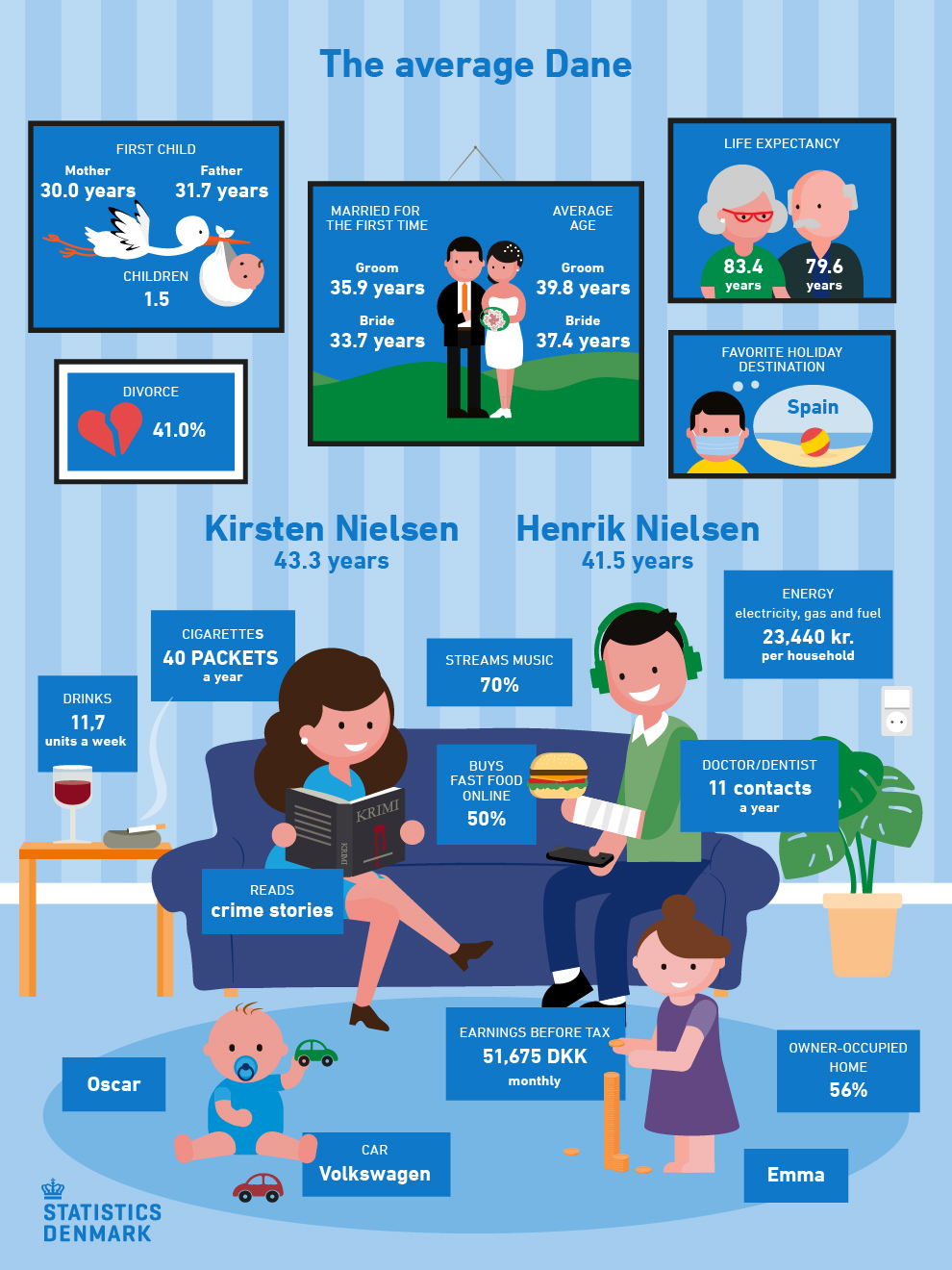The average Dane
The average Dane has the surname Nielsen and is 42.2 years old. He or she sees a doctor or a dentist about eleven times a year. He or she drives a Volkswagen and usually spends his or her holidays in Spain.

Him and her
- Anne and Peter are the most common first names, while Nielsen is the most common last name. The most common full names are Henrik Nielsen and Kirsten Jensen.
- The average age is 42.6 years - women are 43.5 years, and men are 41.7 years.
- 50.3 per cent of the population are women.
- On average, men live 79.9 years, while women live 83.7 years.
Earnings and wealth
- The average employee in Denmark earns DKK 51,675 per month before taxes. The amount includes pension and is calculated by the so-called standardised hourly earnings translated to a full-time monthly salary.
- In 2023, Danes had a median net worth of DKK 730,094 after subtracting liabilities from assets.
Relationships
- 44.4 per cent of Danes above the age of 18 are either married or separated.
- 40.8 per cent of all marriages are dissolved by divorce.
- The average age of women who get married for the first time is 33.9 years, while that of men is 36.0 years.
- On average, brides age is 37.5 years, while grooms are 39.8 years.
- Most divorces happen when people are 40 to 49 years old.
Family life
- Women give birth to their first child at the average age of 30.3 years.
- The average age of all women giving birth is 31.7 years.
- The average age of first-time fathers is 31.9 years, and the average age of all fathers at the birth of their children is 33.7 years.
- These days, new babies are most frequently named Emma or Oscar.
- We have an average of 1.5 children.
- During the first year of a child’s life, mothers on average take 263 days of parental leave, while fathers take 49 days.
Leisure
- "Barbie" was the best-selling film in 2024 with 560,000 sold cinema tickets.
- We don't go to the cinema as often as we used to. In 2023, cinema ticket sales reached 9.7m, which was 2.5m fewer tickets than in 2014.
- When Danes go on holidays of at least four nights, they most often go to Spain. In 2024, Danes spent 15 per cent of their long holidays in Spain.
- The majority of adults use social media. 90 per cent of Danes between the age of 16 and 74 have a profile on social media.
- Nearly twice as many men as women aged 16-74 are using dating apps or dating websites, that is 12 per cent of the men and 7 per cent of the women.
- 48 pct. af de 16-74 årige bruger AI. De unge mellem 16-19 år ligger i top. 83 pct. af denne aldersgruppe bruger AI.
- Crime novels, thrillers and suspense novels are the best-selling books for adults. In 2024, this genre sold almost a million books.
- 1.3 million Danes were regular readers of a national newspaper in 2024.
- The majority of online shoppers ordered clothes, sports goods, tickets for events and fastfood.
-
35 per cent of the 16-74-year-olds sold goods and services online in 2024.
Housing
- One in seven persons moved in the course of 2024 – altogether, 838,147 changes of address were registered during the year.
- 56 per cent of all dwellings are in 2025 occupied by the owner.
- An average of 2.1 persons live in each household.
- In 2025, there are 50,912 students living in halls of residence.
- A total of 97 per cent of Danish families have internet access at home.
Health
- 13 per cent of the Danes were admitted to a hospital in 2023.
- On average, each Dane is in contact with doctors, dentists and medical specialists etc. and medical specialists etc. 11 times per year.
- 7.3 per cent of the population aged 16+ refrained from going to the dentist in 2024, because they could not afford it.
- Danes above the age of 18 purchase beer, wine and spirits corresponding to 9.1 litres of pure alcohol per year. This corresponds to 11.7 units per week.
- The annual sales of cigarettes etc. is 726 – or 40 packets – per capita above the age of 18.
-
35 per cent of Danes between the age of 16 and 74 have purchased medicine via the internet within a year.
